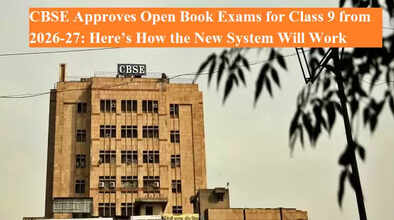CBSE Approves Open Book Exams for Class 9 from 2026-27: Here’s How the New System Will Work

In a major shift towards skill-based learning, the Central Board of Secondary Education (CBSE) has approved the implementation of Open Book Assessment (OBA) for Class 9 students starting from the academic session 2026-27. Once introduced, this system will allow students to refer to their textbooks and notes during exams, moving away from the age-old practice of rote learning.
The decision comes after the success of a pilot study launched in December 2023, which received positive feedback from teachers, students, and parents. According to CBSE sources, the open-book format will initially cover core subjects including Languages, Mathematics, Science, and Social Science.
What Is an Open Book Exam?
An Open Book Exam is an assessment format in which students are permitted to use approved resources—such as textbooks, class notes, or study material—while answering exam questions. Unlike traditional exams that test memory, OBA focuses on a student’s ability to understand, interpret, apply, and analyze information.
Questions will be designed to promote critical thinking, real-life problem solving, and analytical reasoning. This means students may face case studies, data interpretation tasks, or scenario-based questions instead of straightforward recall-based queries.
Why CBSE Is Introducing OBA
The move aligns with the National Curriculum Framework for School Education (NCFSE) 2023 and the National Education Policy (NEP) 2020, both of which emphasize shifting from memorization to competency-based education.
Teachers who participated in the pilot program observed that OBA helps develop:
-
Critical thinking skills
-
Real-world application of knowledge
-
Better comprehension and analytical ability
-
Improved contextual answering skills
CBSE officials believe that this approach will reduce exam stress while also encouraging students to focus on understanding concepts rather than cramming facts.
How the New System Will Be Implemented
From the 2026-27 academic year, OBA will be introduced in all three term exams for Class 9. Students will be allowed to refer to their own textbooks and approved notes during the exams.
Key points about implementation:
-
Applicable Subjects: Languages, Mathematics, Science, and Social Science
-
Frequency: In every term’s pen-and-paper exams
-
Resource Use: Only permitted materials such as textbooks and class notes will be allowed
-
Question Design: Focused on application, analysis, and interpretation instead of memorization
Benefits for Students
Education experts say that open-book assessments are not “easy exams” as many believe. While books may be allowed, finding and applying the correct information under time pressure still requires strong conceptual clarity.
Some major advantages for students include:
-
Reduced memorization burden – No need to cram entire textbooks.
-
Encouragement for deeper learning – Promotes understanding and long-term retention.
-
Real-life skill development – Prepares students for workplace and higher education scenarios.
-
Less anxiety – Less pressure compared to traditional closed-book exams.
A Step Towards Modernizing Indian Education
CBSE’s introduction of Open Book Exams is seen as a progressive reform that could change how students approach learning in India. If successful in Class 9, the model may eventually expand to higher classes and other streams, marking a shift towards global assessment standards.
With this change, the focus in classrooms will move from “How much can you memorize?” to “How well can you think?” — a transformation many educators believe is long overdue.

